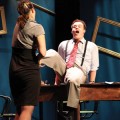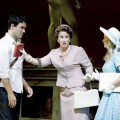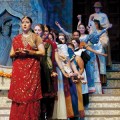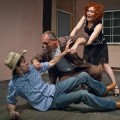The plays that Renegade Theatre Experiment tends to produce are the kind that most other companies wouldn’t even consider, not because they are bad, but because they are weird, edgy or otherwise difficult.
The company’s latest offering, Ouroboros, fits squarely within this tradition. Directed by Virginia Drake and springing from the pen of noted L.A. playwright Tom Jacobson, it’s a singular and puzzling drama that follows two American couples on their respective vacations through Italy.
The first couple is Margaret, a nun in training, and her gay friend, Tor, who have come to Italy to get their minds off the recent death of Tor’s partner. Margaret, played by the exuberant Cindy Powell, is fascinated by Italy’s religious heritage, while Tor, a funny character played with a serious bent by Michael Wayne Rice, half-jokingly asserts his goal to have sex with a priest.
The other couple is Philip, a Lutheran minister, portrayed by Paul Stout as a pathetic man trapped in an unhappy marriage with his wife, Catherine, an obsessive-compulsive off her meds. Blythe Murphy turns in a frenzied performance as Catherine, while Chad Eschman plays all of the minor characters, mainly a colorful assortment of Italians, often with a measure of subtle humor.
Though on different itineraries, the couples repeatedly bump into each other, and Margaret and Philip fall in love. Despite this seemingly normal premise, the characters are confronted with a bizarre sequence of events while wandering through the shadows of Italy’s Gothic monuments.
A time warp occurs, with one couple moving forward and the other moving backward through time. The phenomenon is never fully explained, but it seems to have something to do with a pair of mysterious rings worn by Margaret and Philip, which have deadly consequences when brought together. The rings are fashioned in the shape of a dragon eating its tail – the Ouroboros, an ancient symbol of cyclicality that reflects the play’s design.
Tom Jacobson has described Ouroboros as a “palindrome play.” A palindrome is something that can be read the same way backward as forward, as in “Madam, I’m Adam.” It’s a particularly apt explanation of Ouroboros, which ends and begins with a climax, with much of the exposition sandwiched in the middle. An unusual yet effective narrative device, this creates a terrible sense of foreboding as foreseen yet somehow inevitable events transpire.
Because of the way the play is structured, it can be performed in reverse order, which drastically alters the tone. Depending on which evening you see the play, you will get either The Nun’s Story, a comedy in the classical sense, in which Margaret and Tor travel forward while Philip and Catherine travel backward in time, or The Minister’s Story, a tragedy, in which Margaret and Tor travel backward. Since it is necessary to see both to get the complete experience, RTE allows people to return for a second evening at a discounted price.
It will be worth it. Ouroboros is an intriguing play that provides you a wealth of subjects to think about: fate, religion, the nature of love and the tension between happiness and sacrifice. Margaret and Philip want to be together, but their love, from one perspective, has negative consequences for themselves and those around them. Tor ends up having the fling with a priest that he always wanted, but the man turns out to be a psychopath who brands Tor with stigmata-like wounds. It is made abundantly clear that pursuing one’s destiny can lead to bad things or, as Tor puts it, “God isn’t safe.”
Get Tickets and More Info about ‘Ouroboros’ by Renegade Theatre Experiment
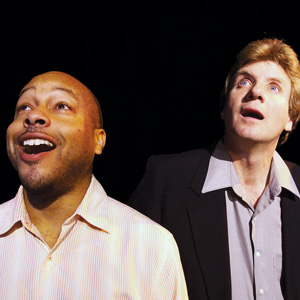
 Local Activist Masao Suzuki Claims FBI Targeted Him
Local Activist Masao Suzuki Claims FBI Targeted Him  Page Replacing Schmidt as Google CEO
Page Replacing Schmidt as Google CEO 